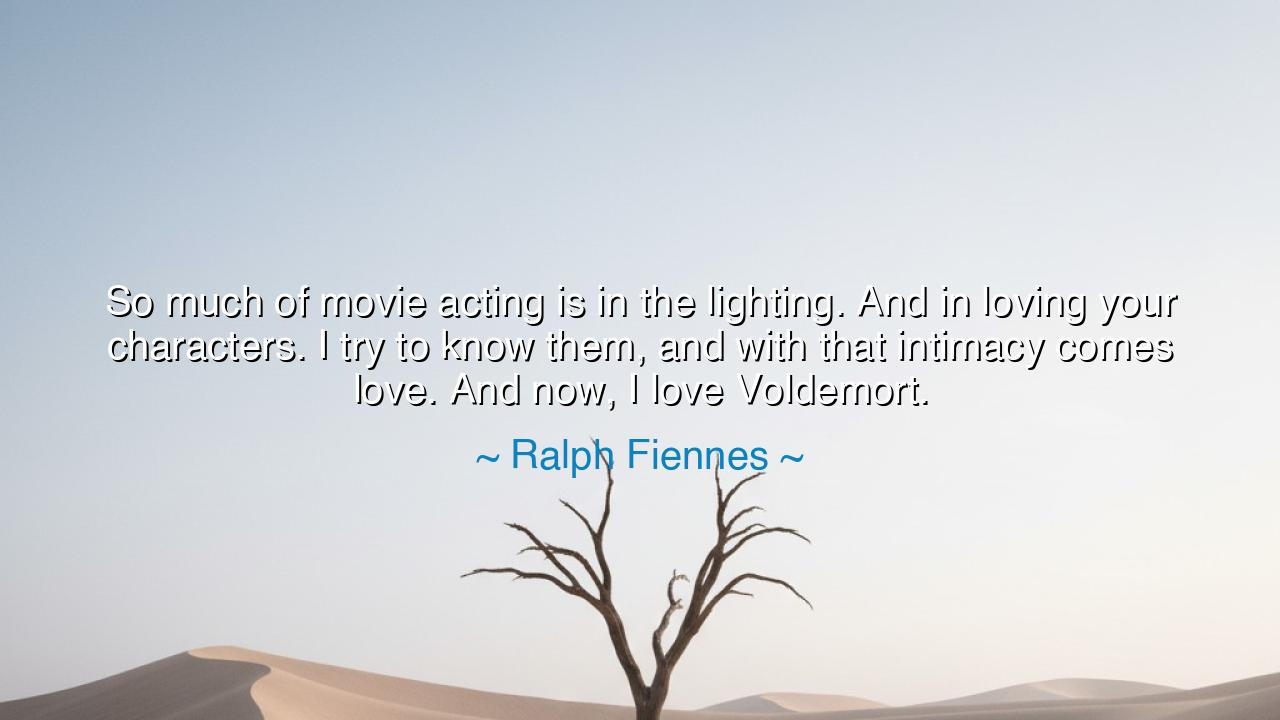
So much of movie acting is in the lighting. And in loving your
So much of movie acting is in the lighting. And in loving your characters. I try to know them, and with that intimacy comes love. And now, I love Voldemort.






Hear, O seekers of wisdom, the words of Ralph Fiennes, master of the stage and screen: “So much of movie acting is in the lighting. And in loving your characters. I try to know them, and with that intimacy comes love. And now, I love Voldemort.” At first, these words may startle, for how could one speak of loving the very face of evil? Yet in them lies a profound truth about art, about humanity, and about the mystery of understanding. For the actor, like the philosopher or the poet, must learn to see not only the light but the shadows, not only the beauty but also the terror, and to hold them both with reverence.
The mention of lighting is no mere technicality. Light is the eternal symbol of revelation. It reveals contours, shapes, and hidden depths. So too in life, the way we choose to illuminate others determines what we see. A harsh light may expose only flaws, while a gentler glow may reveal the humanity beneath. Ralph Fiennes teaches that the actor depends upon light not merely to be seen, but to uncover the inner life of the character. Thus, the lesson is this: what you shine upon others with your gaze—judgment or compassion—decides whether you see monsters or human beings.
To love your characters is to descend into the deepest chambers of empathy. Even when embodying the darkest of souls, the actor must not hate, for hatred blinds and flattens. Instead, he must search for the spark of truth within. In this way, Fiennes came to “love Voldemort,” not because the dark lord was good, but because even evil must be understood if it is to be portrayed with depth. And in this recognition, we learn: even those who err terribly were once children with fears and longings. To understand them is not to excuse them, but to see them as they are—whole, broken, and human.
History offers us a mirror to this truth. Consider Nelson Mandela, who, after 27 years in prison, emerged not with vengeance in his heart but with the resolve to understand and forgive even those who had oppressed him. He studied his enemies, knew their fears, their justifications, and their blindnesses. Through such knowledge came a kind of love—not sentimental, but profound, the love that recognizes common humanity. By refusing to paint them only in the dark of hatred, he illuminated the possibility of reconciliation. His greatness lay not in denying evil, but in understanding it so deeply that he could transform it.
The actor’s craft, then, is not far from the work of the healer or the sage. By learning to know a character—whether noble or wicked—one draws close to the mystery of what it means to be human. This intimacy dissolves fear, for what is known can be embraced, even if not condoned. Thus, Ralph Fiennes’ love for Voldemort becomes symbolic: it is the triumph of empathy over revulsion, of depth over simplicity, of art over judgment. He teaches us that in order to portray truth, one must dare to walk into darkness with open eyes and an open heart.
The lesson for us is both daunting and liberating. We are called not to love wickedness itself, but to seek understanding of the souls who fall into it. We are called to look beyond the surface of others, even those we dislike, and to ask: what light, what shadow, what longing shaped them? In doing so, we expand our own hearts, and we arm ourselves against the poisons of hatred and contempt. This is no small task, for it demands courage and humility. Yet in it lies the power to see the world more truthfully.
So, beloved ones, let this teaching be carved upon your memory: seek to know before you condemn, seek to understand before you dismiss, and seek to love even when faced with the unlovable. In art, in life, and in history, this is the path to wisdom. And if an actor can learn to love even Voldemort, then surely we, too, can learn to see the humanity hidden within those who stand in shadow. For in this practice lies not only the secret of great acting, but the secret of great living.






AAdministratorAdministrator
Welcome, honored guests. Please leave a comment, we will respond soon